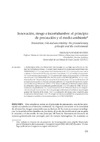Identificador persistente para citar o vincular este elemento:
https://accedacris.ulpgc.es/jspui/handle/10553/70891
| Campo DC | Valor | idioma |
|---|---|---|
| dc.contributor.author | Navarro Batista, Nicolás | - |
| dc.date.accessioned | 2020-03-13T13:48:02Z | - |
| dc.date.available | 2020-03-13T13:48:02Z | - |
| dc.date.issued | 2014 | - |
| dc.identifier.issn | 1577-533X | - |
| dc.identifier.uri | https://accedacris.ulpgc.es/handle/10553/70891 | - |
| dc.description.abstract | Este estudio se centra en el principio de precaución, una de las principales novedades en el derecho ambiental. Su origen se encuentra en la necesidad de afrontar los riesgos potenciales que se derivan de los nuevos avances tecnológicos. La incertidumbre científica es, por tanto, el punto de partida en el que se gesta la creación y el desarrollo de este principio. El Derecho Internacional reconoce de manera generalizada este principio pero de manera heterogénea. En ocasiones es recogido como un enfoque o un criterio, en otras como un auténtico principio. Esta diversidad pone de relieve que existen muchas reservas respecto a la consolidación de este principio. Pero, más allá de las diferencias terminológicas, el estudio demuestra que existe un consenso internacional en torno a la necesidad de contar con un instrumento jurídico que afronte los riesgos potenciales de las nuevas actividades. En la Unión Europea, la precaución se ha convertido ya en un principio general del derecho que extiende su influencia no sólo a la legislación ambiental sino también a otros ámbitos como la salud. La legislación y la jurisprudencia europeas están contribuyendo a forjar una concepción moderada de este principio que puede contribuir a afianzarlo como un principio general del Derecho Internacional. | - |
| dc.description.abstract | This study focuses on the precautionary principle, one of the main developments in environmental law. Its origin lies in the need to address the potential risks arising from new technological developments. Scientific uncertainty is therefore the starting point in the origin and development of this principle. International law recognizes this principle widely but heterogeneously. Sometimes it is regarded as an approach, in others as a true principle. This diversity highlights that there are many reservations regarding the consolidation of this principle. But beyond the terminological differences, the study shows that there is an international consensus on the need for a legal instrument that manages the potential risks of new activities. In the European Union, caution has already become a general principle of law that extends its influence not only to environmental legislation but also other areas such as health. The European legislation and case law are helping to forge a balanced conception of this principle that can help establish it as a general principle of international law. | - |
| dc.language | spa | - |
| dc.relation | DER 2012-36703 | - |
| dc.relation.ispartof | Cursos De Derecho Internacional Y Relaciones Internacionales De Vitoria-Gasteiz/Vitoria-Gasteizko Nazioarteko Zuzenbide Eta Nazioarteko Harremanen Ikastaroak | - |
| dc.source | Cursos de derecho internacional y relaciones internacionales de Vitoria-Gasteiz = Vitoria-Gasteizko nazioarteko zuzenbide eta nazioarteko herremanen ikastaroak [ISSN 1577-533X] n. 1, p. 225-332 | - |
| dc.subject | 5603 Derecho internacional | - |
| dc.subject | 560507 Derecho público | - |
| dc.subject.other | Riesgo | - |
| dc.subject.other | Criterio o enfoque de precaución | - |
| dc.subject.other | Incertidumbre científica | - |
| dc.subject.other | Principio de precaución | - |
| dc.subject.other | Medio ambiente | - |
| dc.subject.other | Desarrollo sostenible | - |
| dc.subject.other | Risk | - |
| dc.subject.other | Precautionary approach | - |
| dc.subject.other | Scientific uncertainty | - |
| dc.subject.other | Precautionary principle | - |
| dc.subject.other | Environment | - |
| dc.subject.other | Sustainable development | - |
| dc.title | Innovación, riesgo e incertidumbre: el principio de precaución y el medio ambiente | - |
| dc.title.alternative | Innovation, risk and uncertainty: the precautionary principle and the environment | - |
| dc.type | nfo:eu-repo/semantics/article | - |
| dc.type | Article | - |
| dc.identifier.url | https://dialnet.unirioja.es/servlet/articulo?codigo=5217934 | - |
| dc.description.lastpage | 232 | - |
| dc.description.firstpage | 225 | - |
| dc.investigacion | Ciencias Sociales y Jurídicas | - |
| dc.type2 | Artículo | - |
| dc.description.observaciones | DER 2012-36703 | - |
| dc.utils.revision | Sí | - |
| dc.identifier.ulpgc | Sí | - |
| dc.contributor.buulpgc | BU-DER | - |
| item.grantfulltext | open | - |
| item.fulltext | Con texto completo | - |
| crisitem.author.dept | GIR Sociedad y Derecho | - |
| crisitem.author.orcid | 0000-0001-6560-9907 | - |
| crisitem.author.parentorg | Departamento de Derecho Público | - |
| crisitem.author.fullName | Navarro Batista,Nicolás | - |
| Colección: | Artículos | |
Visitas
353
actualizado el 15-ene-2026
Descargas
855
actualizado el 15-ene-2026
Google ScholarTM
Verifica
Comparte
Exporta metadatos
Los elementos en ULPGC accedaCRIS están protegidos por derechos de autor con todos los derechos reservados, a menos que se indique lo contrario.
